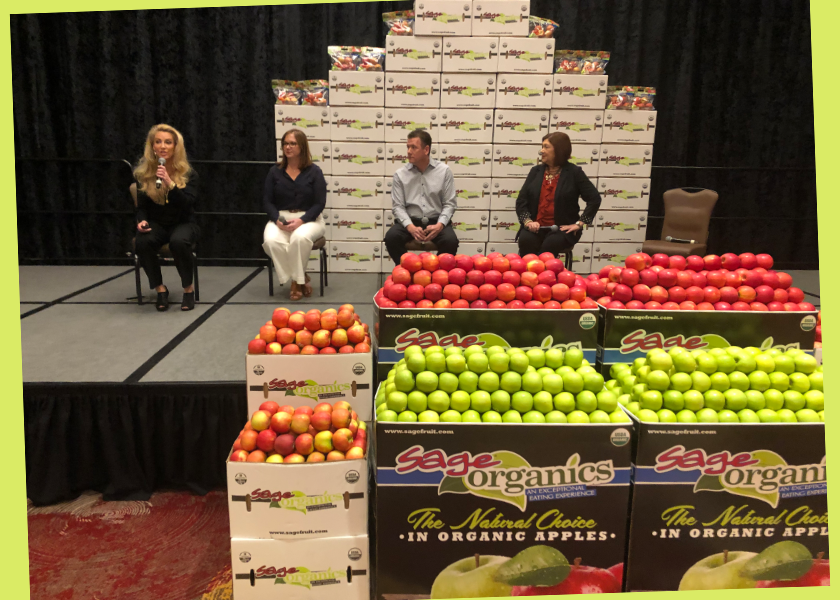At this GOPEX session, health, flavor and fun meet in the middle

HOLLYWOOD, Fla. — Consumers want more of everything: More functional health benefits and more flavor explosions on their tongues.
Grower-shippers, retailers and produce managers can satisfy those desires, but educating consumers about it — as well as in-store employees — is another hurdle altogether.
That’s the challenge three panelists and moderator Wendy Reinhardt Kapsak, president and CEO of Produce for Better Health Foundation, discussed at “The Sweet Spot: Where Nutrition and Flavor Meet.” The education session was one of seven such sessions at the Global Organic Produce Expo Jan. 1-Feb. 2 at Seminole Hard Rock Hotel and Casino in Hollywood, Fla.
“Flavor and texture are everything. It’s a win-win when you educate the customer on flavor profiles and have knowledge-based learning modules for sales staff,” said panelist Scott Bennett, produce sales and merchandising manager of retailer Jewel-Osco, Itasca, Ill. “Customers are definitely looking for better nutritional information, and we have to do a better job figuring that out … Employees, we sometimes put on T-shirts explaining the different varieties. It’s what we call walking billboards. And it works.”
Organic goes hand-in-hand with nutrition and health in the minds of many consumers, panelists said. Everyone in the industry can benefit from learning what shoppers want from their food, especially organic food.
Public perception of health has changed its meaning in the last four decades:
- Healthy 1.0: (1980s to early 2000s) Weight management. “The focus was all about what the food didn’t have, such as low fat, low calorie, low carb — that deprivation mentality,” said panelist Pam Smith, PBH registered dietitian nutritionist;
- Healthy 2.0: (Early 2000s and beyond) Feel good. The focus is on local, natural and organic. People started looking at sourcing, wanting more probiotics. The shift was to a more holistic view; and
- Healthy 3.0: (Early 2010s and beyond) Functional. The focus is on quality protein, antioxidants and superfoods. “It’s not about what it doesn’t have. It’s about what it does have,” Smith said.
Consumers don’t want to hear as much about how their fresh produce helps prevent cancer or heart disease, Kapsak said.
“We’re now also talking to immediate health benefits, such as emotional wellbeing. What we really want to tap into is what people feel emotionally. People’s feelings are immediate, not four months from now. Greater mental clarity, feeling satisfied, happiness, flavor and emotions are connected,” she said. “This is an opportunity the industry hasn’t really taken. Think about immediate emotions and the stuff of life and how we can tap into that.”
The most-viewed PBH content by millennials and Gen Z consumers was about food as an aphrodisiac, Kapsak said.
The session crowd was suddenly silent. “Why is everyone so silent now?” Kapsak joked.
Then Smith ran with that ball that Kapsak kicked to her.
Smith explained: “That’s because food that’s good for the heart is good for what’s down south too,” she said as laughter erupted from the crowd. “Is fruit Viagra? Maybe not.”
Heart-healthy produce doesn’t hurt when it comes to matters of the heart, both of which seem to help pump blood more easily to assist in all bodily functions.
Shoppers can learn these messages and others on QR codes placed on produce stickers, packaging, flyers and point-of-sale materials.
QR codes are also a way to encourage employees working the grocery store floor to answer shopper questions about produce with more confidence.
“A lot of supermarket staff don’t feel like they’re expert enough to answer questions, but make it so that they don’t have to know everything but can access it easily,” Smith said.
Related news:







